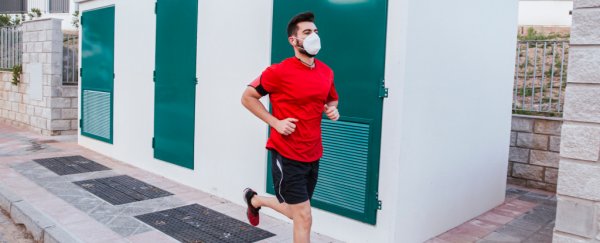In places all over the world, people are being told or encouraged to wear masks when they're out. In some places, they're also ordered to stay at home, only being permitted to leave their house for essential things, including exercise.
Those instructions make for a dilemma. Should people be wearing masks if they're doing exercise, engaging in strenuous or intense physical activity? Wouldn't wearing a covering over your mouth and nose make it trickier to breathe at a time when you're already working harder than usual to pull air into your lungs?
Since the early days of the coronavirus pandemic, scientists and health authorities have had serious concerns about this. The World Health Organisation's official advice maintains that people "should NOT wear masks while exercising, as masks may reduce the ability to breathe comfortably".
It may not be as simple as that, however.
A new review of the effects of masks on the cardiorespiratory system - the heart, blood vessels, and lungs - during physical activity suggests most people should effectively be able to breathe just fine with a mask on while exercising, although it may not always feel that way.
"There might be a perceived greater effort with activity, but the effects of wearing a mask on the work of breathing, on gases like oxygen and CO2 in blood or other physiological parameters, are small, often too small to be detected," says exercise physiologist Susan Hopkins from the University of California San Diego (UCSD).
In the new study, Hopkins and her co-authors reviewed the existing scientific literature looking at the effects of different face coverings on cardiorespiratory response during physical activity, considering dozens of different studies, and encompassing different sorts of masks – including cloth face coverings, surgical masks, N95 respirators, and industrial respirators.
The researchers acknowledge that the literature directly evaluating this issue is evolving and that more studies are still needed.
Nonetheless, they say the current evidence suggests masks worn by healthy people during exercise do not seem to significantly impact lung function and oxygen intake – despite the minimal resistance to airflow that they create – meaning that wearing a mask or respirator during physical activity is unlikely to cause harm.
However, dyspnea (the feeling of having shortness of breath) and other forms of discomfort may potentially increase when people exercise and wear masks, especially if they're not used to wearing masks.
"Wearing a face mask can be uncomfortable," says Hopkins.
"There can be tiny increases in breathing resistance. You may re-inhale warmer, slightly enriched CO2 air. And if you're exercising, the mask can cause your face to become hot and sweaty. But these are sensory perceptions. They do not impact cardiopulmonary function in healthy people."
The researchers say the same result seems to apply to both young and old people, regardless of gender, but they do point out that patients with severe cardiopulmonary disease could be an exception, due to their increased chances of experiencing exertional dyspnea.
That discomfort might serve as a basis for seeking exemptions from mask regulations for such individuals, the researchers suggest, but it's something that also needs to be weighed against the risks of not wearing masks, which could end up being far more serious.
"In such cases, these individuals might feel too uncomfortable to exercise, and that should be discussed with their doctor," Hopkins says.
"However, the fact that these individuals are at great risk should they contract COVID-19 must also be considered."
For the rest of us, the findings – which are independently backed up by a recent experiment conducted by Canadian researchers – mean we shouldn't worry too much about the discomfort of wearing masks while we exercise.
Sure, it doesn't feel great, but it really beats the alternative.
The findings are reported in Annals of the American Thoracic Society.
